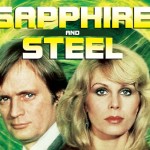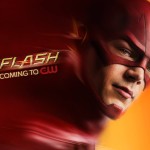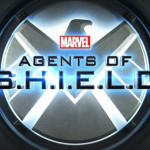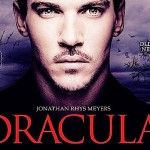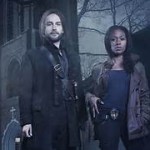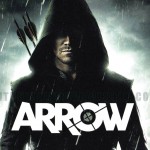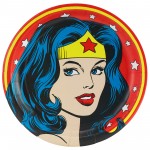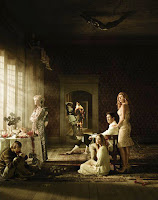Sapphire and Steel has been getting some buzz amongst fandom lately. Neil Cross, the creator of the BBC series Luther has stated that he wants to do a revival of Sapphire and Steel as his next project.
For those of us who were getting into British Sci-fi shows in the 80s, this is an exciting prospect; however, I’m sure a lot of you have no idea what I am talking about.
So what is Sapphire and Steel and why are some of us excited about a reboot?
Doctor Who, Blake’s 7, and Sapphire and Steel were considered the holy trinity of British Science Fiction in the 80’s. Which is interesting because I, personally, don’t consider it Science Fiction; I think of it as horror. Sapphire and Steel is a British TV series created and written exclusively by Peter J. Hammond that aired from 1979 to 1982. It was broadcast on ITV, which was a commercial network in Britain that was often the main alternative to the BBC.
The premise of the series is that if a breach in the fabric of time occurs, other worldly operatives are dispatched to fix the situation before malignant forces from outside of time can take advantage of it.
Most of our knowledge of the operatives comes from the opening narration of each episode:
“All irregularities will be handled by the forces controlling each dimension. Transuranic heavy elements may not be used where there is life. Medium atomic weights are available: Gold, Lead, Copper, Jet, Diamond, Radium, Sapphire, Silver and Steel.
Sapphire and Steel have been assigned.”
It is implied that this corresponds to the periodic table, but since none of the named operatives are named after elements we cannot be sure.
The series follows operatives Sapphire (Joanna Lumley) and Steel (David McCallum) as they investigate the breaches in time and work to correct them. The two are clearly not of this world. They can communicate with each other telepathically. Sapphire can manipulate time in a limited fashion, rolling it back, as well as having psychometry. Steel is super strong, has limited telekinesis, and in one episode was able to lower his temperature to near absolute zero to defeat a threat, but at the cost of weakening himself. In personality, Steel is cold and a bit rough in his dealings with humans, as opposed to Sapphire who is warmer, although this is implied to be a learned skill when Steel calls her a diplomat.
The time breaches are often caused by some anachronism in the area. An old nursery rhyme book, a party exactly recreating the 1930s, and a doctored photo mixing old and new elements. Once a breach has happened, Sapphire and Steel are dispatched and have to figure out why it happened, what it unleashed, and how to fix it.
Occasionally, in the course of an assignment a third operative will be sent in. The two other operatives we meet are Lead (Val Pringle), a jovial giant who can insulate Steel against the weakening effect of lowering his body temperature, and Silver, a technician who can transmute small bits of matter and can manipulate technology.
One of the features of the series that made it stand out (and makes it excellent horror) is that Sapphire and Steel’s main goal is sealing the breach. While they will attempt to save the humans caught up in it, this is a secondary goal and if letting a human die will ensure the breach is sealed, they will let the human die.
Since the series was on ITV it had what could kindly be considered a micro budget. Consider that Sapphire and Steel’s run was during the end of Tom Baker’s run on Doctor Who and the first year of Peter Davidson’s. People joke about the cheap effects of that era. Now consider that to Sapphire and Steel, Doctor Who’s budget would seem lavish. For most shows this would have been a problem, but Sapphire and Steel turned it into an advantage. Since each episode had limited sets, it was simply that during a breach no one could get out, which was usually Sapphire’s doing. The writing was also very good and made the episodes slow, but well-paced. Tension was built to the point that a pool of light on the ground, clearly created by a stage hand with a flash light, was nonetheless absolutely terrifying.
And then there was the acting. Joanna Lumley and David McCallum were already established when the series was made (Lumley from the New Avengers and McCallum from the Man From U.N.C.L.E.), but still years away from their bigger successes (Absolutely Fabulous and NCIS). In Sapphire and Steel they convey the otherworldliness of the characters and make them sympathetic even when having to make the hard choices their jobs require.
Sapphire and Steel was a serialized program, just as the original run of Doctor Who was. In all there were only six stories made, ranging from an hour and a half to three hours, depending on how many half hour segments each story required.
Be warned that some of the episodes can be very scary. One person online once said a story can go from “give me a break” to “Someone please hold me” with very little warning. And it is famous in fandom for having a downer ending in the final episode.
If you decide you want to seek out the series you are in luck. Shout Factory did a rerelease of the series in 2013. You can go to their site to find it, and the series is available from Amazon for about $26.00 as of this writing.
I am going to give Sapphire and Steel a B. I think horror fans who give it a chance will be pleasantly surprised, but I can see where the slow pacing and cheap effects could detract from others enjoying it.

